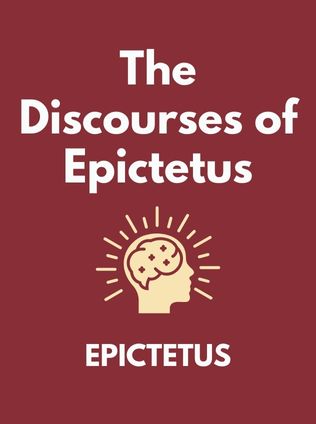
The Discourses of Epictetus
By Epictetus
Published 01/0125
About the Author
Epictetus, a name synonymous with Stoic philosophy, stands as one of the most influential thinkers in Western history. Born around 50 AD in the city of Hierapolis in Phrygia, which is now in modern-day Turkey, Epictetus was born into slavery. Despite his lowly beginnings, he rose to prominence as a philosopher, illustrating the Stoic ideal that one’s external circumstances do not determine one’s inner freedom or happiness. His master, Epaphroditus, allowed him to study philosophy under the tutelage of the Stoic philosopher Musonius Rufus, a privilege that laid the foundation for his future teachings. Later in life, after gaining his freedom, Epictetus began teaching philosophy in Rome, but when the Emperor Domitian banned all philosophers from the city, he moved to Nicopolis in Greece, where he established a school of Stoicism.
Epictetus never wrote down his teachings; instead, his discourses were recorded by one of his most devoted students, Arrian of Nicomedia. Arrian’s recordings, often said to be nearly verbatim, capture the essence of Epictetus's teachings, which emphasize the development of self-control and fortitude as a means of overcoming destructive emotions. The central tenet of his philosophy is the idea that while we cannot control external events, we can control our responses to them, thereby achieving a state of inner tranquility.
Main Idea
The Discourses of Epictetus revolves around the central idea that true happiness and freedom are the results of accepting life as it is and focusing on what we can control. Stoicism, as Epictetus teaches it, is a philosophy deeply rooted in logic and contemplation. It asserts that the key to a fulfilling life is to live in harmony with nature, understanding that we are part of a larger whole. This involves accepting things as they are, recognizing our limited control over external circumstances, and exercising control over our own thoughts, desires, and actions. By doing so, we can maintain our peace of mind regardless of what happens around us.
Table of Contents
- The Importance of Reason and Choice
- What You Can Choose: Beliefs, Desires, and Actions
- Control Versus Acceptance
- You Are Always In Control
- The Unimportance of External Things
- How to Face Challenges
- Strategies for Facing Challenges
- How to Live Well
- Choose Your Relationships Carefully
- Epictetus’s Code of Conduct: Quiet Dignity and Discipline
The Importance of Reason and Choice
At the heart of Epictetus’s teachings is the concept of reason as the defining characteristic of human beings. According to him, reason is what sets us apart from other animals and allows us to navigate the complexities of life. "Your purpose is to live a happy and virtuous life by acting in accordance with Nature," Epictetus asserts. He argues that it is through reason that we can align ourselves with the natural order of the universe, which is essential for living a life of virtue. For Epictetus, reason is not just a tool for making decisions but the very essence of our humanity. It is through the disciplined use of reason that we can understand the world around us and make choices that lead to happiness and fulfillment.
Epictetus believes that the quality of our lives is directly linked to the quality of our reasoning. He teaches that it is not external events that disturb us, but rather our judgments about them. This Stoic idea is encapsulated in one of his most famous quotes:
"It is not what happens to you, but how you react to it that matters." - EpictetusThis statement underscores the Stoic belief that we have the power to control our own happiness by controlling our reactions to events, rather than trying to control the events themselves.
What You Can Choose: Beliefs, Desires, and Actions
In his teachings, Epictetus draws a clear distinction between what is within our control and what is not. This distinction is crucial for achieving inner peace and contentment. Epictetus argues that the only true power we have lies in our ability to choose our beliefs, desires, and actions. He emphasizes that external circumstances—things like wealth, health, and reputation—are beyond our control and should not be the source of our happiness or distress.
"The only thing you can fully control is your own reasoning," Epictetus explains. This idea is central to his philosophy. By focusing on what we can control—our thoughts, beliefs, and actions—we can maintain peace of mind even in the face of adversity. For example, consider an employee who is dissatisfied with his job. If he can let go of his attachment to the paycheck and instead focus on his own actions and attitudes, he regains control over his happiness. He may choose to improve his skills, seek new opportunities, or even change his attitude towards his current job. In doing so, he is exercising his reason and aligning his actions with what is within his control.
Epictetus also teaches that by controlling our desires, we can avoid unnecessary suffering. He warns against desiring things that are beyond our control because such desires inevitably lead to disappointment. Instead, we should focus on cultivating desires that are within our control, such as the desire for wisdom, virtue, and self-improvement. By doing so, we protect ourselves from the emotional turmoil that comes from unfulfilled desires and maintain our inner tranquility.
Sign up for FREE and get access to 1,400+ books summaries.
You May Also Like
The Subtle Art of Not Giving a F*ck
A Counterintuitive Approach to Living a Good Life
By Mark MansonRich Dad Poor Dad
What the Rich Teach Their Kids About Money - That the Poor and Middle Class Do Not!
By Robert T. KiyosakiHow To Win Friends and Influence People
The All-Time Classic Manual Of People Skills
By Dale Carnegie



















